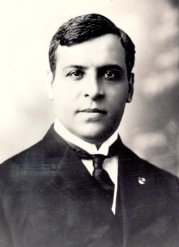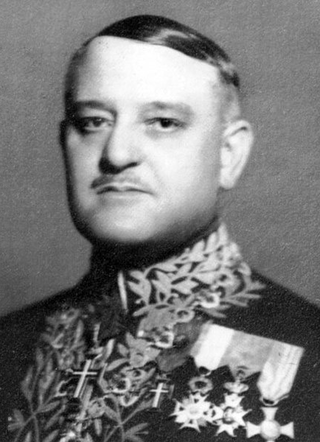
Aristides de Sousa Mendes do Amaral e Abranches was a Portuguese consul during World War II.

During World War II, some individuals and groups helped Jews and others escape the Holocaust conducted by Nazi Germany.

Fernando José Mendes Rosas is a Portuguese historian, professor, and politician.

Operation Willi was the German code name for the unsuccessful attempt by the SS to kidnap Prince Edward, Duke of Windsor in July 1940 and induce him to work with German dictator Adolf Hitler for either a peace settlement with Britain, or a restoration to the throne after the German conquest of the United Kingdom.

The history of the Jews in Portugal reaches back over two thousand years and is directly related to Sephardi history, a Jewish ethnic division that represents communities that originated in the Iberian Peninsula.

In the decades since the Holocaust, some national governments, international bodies and world leaders have been criticized for their failure to take appropriate action to save the millions of European Jews, Roma, and other victims of the Holocaust. Critics say that such intervention, particularly by the Allied governments, might have saved substantial numbers of people and could have been accomplished without the diversion of significant resources from the war effort.

HIAS is a Jewish American nonprofit organization that provides humanitarian aid and assistance to refugees. It was originally established in 1881 to aid Jewish refugees. In 1975, the State Department asked HIAS to aid in resettling 3,600 Vietnam refugees. Since that time, the organization continues to provide support for refugees of all nationalities, religions, and ethnic origins. The organization works with people whose lives and freedom are believed to be at risk due to war, persecution, or violence. HIAS has offices in the United States and across Latin America, Europe, Africa, and the Middle East. Since its inception, HIAS has helped resettle more than 4.5 million people.

At the start of World War II in 1939, the Portuguese Government announced on 1 September that the 550-year-old Anglo-Portuguese Alliance remained intact, but since the British did not seek Portuguese assistance, Portugal was free to remain neutral in the war and would do so. In an aide-mémoire of 5 September 1939, the British government confirmed the understanding. As Adolf Hitler's occupation swept across Europe, neutral Portugal became one of Europe's last escape routes. Portugal was able to maintain its neutrality until 1944, when a military agreement was signed to give the United States permission to establish a military base in Santa Maria in the Azores and thus its status changed to non-belligerent in favour of the Allies.

Pedro Teotónio Pereira was a Portuguese politician and diplomat. He played a decisive role for the Allies, in drawing Spain with Portugal into a neutral peninsular bloc during World War II.

António de Oliveira Salazar was a Portuguese politician who served as Prime Minister of Portugal from 1932 to 1968. Having come to power under the Ditadura Nacional, he reframed the regime as the corporatist Estado Novo, with himself as a virtual dictator. The regime he created lasted until 1974, making it the longest-lived authoritarian regime in Europe.
Paul Hoyningen-Huene is a German philosopher who specializes in general philosophy of science and research ethics. He is best known for his Neo-Kantian interpretation of Thomas S. Kuhn's ideas. Hoyningen-Huene, until 2014, held the chair for theoretical philosophy, particularly philosophy of science at Leibniz Universität Hannover (Germany) and was director of the Center for Philosophy and Ethics of Science.

Carlos de Almeida Afonseca Sampaio Garrido was a Portuguese diplomat credited with saving the lives of approximately 1,000 Jews in Nazi-occupied Hungary while serving as Portugal's ambassador in Budapest between July and December 1944.

Moisés Bensabat Amzalak was a Portuguese scholar and economist. Amzalak was born and educated in Lisbon. He combined a successful business career with broad academic activity. A devoted Jew, a central figure in the Portuguese Jewish Community, he headed the Lisbon Jewish community from 1926 until his death in 1978.

Neill Lochery is a Scottish author and leading historian on the modern history of Europe and the Mediterranean Middle East. He is a frequent contributor to newspapers and journal publications around the world. Lochery is Professor of Middle Eastern and Mediterranean Studies at University College London.

The 1936 Naval Revolt or Tagus boats mutiny was a mutiny in Portugal that occurred on 8 September 1936 aboard the aviso Afonso de Albuquerque and destroyer Dão. It was organized by the Revolutionary Organization of the Fleet, a left-wing group with links to the Portuguese Communist Party.
Agostinho Lourenço da Conceição Pereira was a Portuguese soldier, best known for founding and running the Portuguese political police under the Estado Novo.
The German foreign office had a sizable network of diplomatic missions when Nazis came to power in 1933. While it was a deeply traditional and elitist organisation within the German civil service, it enthusiastically helped the Nazis prosecute an ambitious foreign policy.
Portugal was officially neutral during World War II and the period of the Holocaust in German-occupied Europe. The country had been ruled by an authoritarian political regime led by António de Oliveira Salazar but had not been significantly influenced by racial antisemitism and was considered more sympathetic to the Allies than was neighbouring Francoist Spain.

Augusto Isaac d’Esaguy was a Portuguese medical historian who headed the Portuguese Committee of Assistance to Jewish Refugees, a Relief Committee for the German and Polish Refugees, established in 1933, that played a crucial role in helping Jewsih refugees during World War II.















